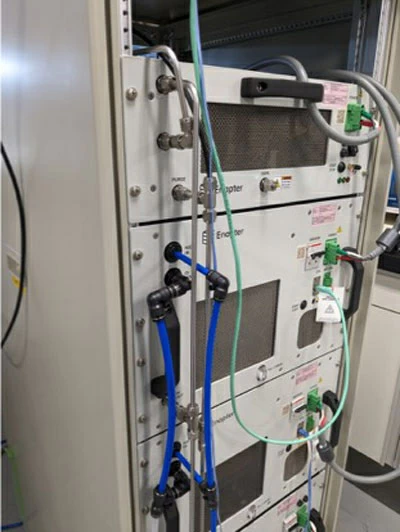The Tokyo Tech Academy of Energy and Informatics, the Tokyo Tech InfoSyEnergy Research and Education Consortium, the Tokyo Tech Academy of Energy and Informatics (Head of Consortium and Academy Director Manabu Ihara, Prof.) and several companies, including Toshiba Corporation and Toshiba Energy Systems & Solutions Corporation, are working together to develop a platform.
 Water electrolyzer. Image Credit: Tokyo Institute of Technology
Water electrolyzer. Image Credit: Tokyo Institute of Technology
The innovative platform 100 kW hydrogen fuel cell–digital twin aims to reconcile carbon neutrality and economic gain by combining hydrogen from renewable energy sources and waste plastic.
It optimizes the design and control of a 100-kW hydrogen fuel cell. The platform was set up and put into use in the Tokyo Tech Environmental Energy Innovation (EEI) Building.
Carbon neutrality is expected to be assisted by hydrogen produced using renewable energy. The high cost of water electrolyzers and the incompatibility of electrolyzer sizes, among other factors, are preventing the introduction from moving forward as quickly as anticipated at the moment.
Therefore, this system generates hydrogen by feeding power from solar cells in the EEI Building to a small-capacity water electrolyzer, to boost incentives for adopting hydrogen as a technology for carbon neutrality.
Additionally, it blends and provides the hydrogen fuel cell with the proper proportion of hydrogen created from waste plastic (by thermal breakdown of waste plastic, steam reforming, shift reaction, and refining process; Resonac Holdings Corporation).
The EEI Building and campus will get power from the fuel cell, and waste heat will be provided to the air conditioning system (central heating and cooling) of the EEI Building for enhanced waste heat usage.
The system is the first in the world to mix renewable energy hydrogen and waste plastic hydrogen, deliver the combination to a fuel cell, and connect it to the building’s air conditioning system for advanced use of power and heat.
It aims to achieve both carbon neutrality and sustainable economic growth. They want to create an urban hydrogen energy usage model that properly blends and maximizes both local and global hydrogen in the future.
The system is connected to the Tokyo Institute of Technology’s (Tokyo Tech) Ene-Swallow® intelligent energy system, which controls peak cuts at the Tokyo Tech Ookayama Campus. Its comprehensive real-time operating data is gathered in a database and utilized as energy big data for collaborations between industry and academia in research and teaching.
Additionally, with Ene-Swallow®, the fuel cell mixing ratio of hydrogen from renewable energy sources and hydrogen from waste plastic can be managed in real-time.
Future device capacity design and system control will be achievable with the help of the collection of comprehensive data.
As part of the R&D for “Carbon-neutral digital twin with the core of energy big data” in the JST-MIRAI Program “Advanced Intelligent Information Society” mission area (Program Officer: Eisaku Maeda), they will work for further development and advancement as a carbon neutral digital twin (Ene-Swallow® Digital Twin), a platform that can be incorporated and linked with the goal of accomplishing carbon neutral and sustainable economic growth.
Source: https://www.titech.ac.jp/english